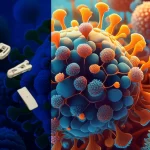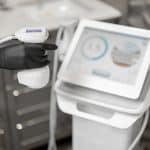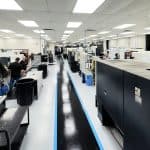 When it comes to choosing a thermoplastic material for your medical applications, product durability, agency approval, biocompatibility and cleanliness aren’t just desirable—they’re essential. Beyond even that, though, a host of other factors must be considered when determining which high-performance plastic or composite material to use for an implant, orthopedic surgical guides, body fluid contact components, spinal devices, or surgical instruments. Medical product applications are becoming more and more advanced due to critical performance and alignment requirements as well as the need for radiolucency to support minimally invasive procedures. Therefore, the choice of plastic material specified for a given application as well as a manufacturer with battle-hardened experience is the critical first step in your decision process.
When it comes to choosing a thermoplastic material for your medical applications, product durability, agency approval, biocompatibility and cleanliness aren’t just desirable—they’re essential. Beyond even that, though, a host of other factors must be considered when determining which high-performance plastic or composite material to use for an implant, orthopedic surgical guides, body fluid contact components, spinal devices, or surgical instruments. Medical product applications are becoming more and more advanced due to critical performance and alignment requirements as well as the need for radiolucency to support minimally invasive procedures. Therefore, the choice of plastic material specified for a given application as well as a manufacturer with battle-hardened experience is the critical first step in your decision process.
AIP has well over three decades of expertise with thermoplastic materials, and understands how plastics react when machined. We are one of a very select few companies able to hold incredibly tight tolerances in plastic parts. AIP has been successfully audited by some of the most stringent OEMs in the orthopedic and medical device industries, and are ISO 13485:2016, ISO 9001:2015 and FDA registered.
Here are just a few initial, yet critical considerations that take place when we determine the thermoplastic to best suit your particular medical or life science application.
Biocompatibility
If your components are going to come into contact with body tissue or fluids, then those components must be biocompatible per ISO 10993; if the manufacturer you are working with is not familiar with this standard and cannot provide you with this certification for the material, then move on to a manufacturer with medical industry knowledge. This is especially true if the polymers will undergo long-term contact with body tissues and fluid, such as when used as an implant. Polymers can undergo degradation due to biochemical and mechanical factors in the body, which results in ionic attack and formation of hydroxyl ions and dissolved oxygen. In turn, this can lead to tissue irritation, inflammation, and other reactions with body-like corrosion, wear and potential death. Due to this, very few polymers are available as medical grade for medical application, with an even smaller amount considered a candidate for implants.
AIP Precision Machining includes machined PEEK implants among its many capabilities for custom medical applications precisely due to PEEK’s biocompatibility. PEEK is also inert to body fluids, making it exceptional for bone surgery as well as areas of traumatology and orthopaedics. Another valuable trait of PEEK is that this material has a very similar modulus to that of human bone. The similar modulus to bone reduces the potential for stress shielding. Stress shielding is common with metallic implants whereby the metal implant and bone do not become one nor work in unison to form a single construct. By using Invibio’s PEEK Optima or Solvay’s Zeniva PEEK as an implant material, the bone and PEEK will grow into a single construct mimicking the bone’s natural tendency to repair the fracture or fusion.
Sterilization Compatibility
Plastics react differently to various sterilization methods, and if a product is not a single-use device and involves body tissue and fluid contact, then it may regularly undergo sterilization. The usual sterilization methods are radiation (gamma/e-beam), chemical (ETO), or autoclave (steam). ETO is rarely a concern, but radiation and autoclaving both require resistance from plastics. Several radiation resistant thermoplastics are:
When it comes to autoclaving, the best polymers for resistance are PPSU and PEEK, with both capable of handling exposure to thousands of cycles.
AIP takes the matter of sterilization seriously and ensures the highest level of sanitation down to the sub-molecular level for its products. By designing, stress relieving and machining only plastics, AIP significantly reduces the threat of metallic cross-contamination and therefore allows for the highest hygienic products possible.
Chemical Resistance
A polymer can be exposed to plenty of disinfection chemicals in a hospital. That exposure can deteriorate plastics, and negatively affect part performance. Polymer chains can be affected by isopropyl alcohol, bleaches, and peroxides. Semi-crystalline polymers like PP, PE, PTFE and PEEK can be expected to have better chemical resistance than amorphous polymers like ABS and PC. However, it’s important to check the performance to be certain of resistances, as exceptions can take place.
With decades of experience working with thermoplastics, AIP guarantees extreme chemical resistance in its material selection for your medical applications.
Electrical & Thermal Properties
Dielectric strength and thermal resistance are necessary for medical devices enclosed in areas that require high heat resistance. Thermoplastics such as PC (Polycarbonate), PC blends, PPS (polyphenylene sulfide), PEI and PS (polystyrene) blends have electrical properties that perform well, some even at elevated temperatures.
AIP’s material library includes thermoplastics that exhibit extreme thermal performance, and we are familiar with machining them in applications for medical life & sciences.
Mechanical Properties
Properties such as tensile and compressive strength, wear resistance, impact strength, and bending stiffness also must be considered when choosing your thermoplastic. Engineered thermoplastics such as PC, PEEK, PPSU, POM, PEI and reinforced grades of these same materials (glass, aramid and carbon fillers) perform very well in this respect, making them ideal for a variety of climate conditions, such as during transportation.
AIP provides thermoplastics that show extreme wear resistance, x-ray visibility or invisibility and high structural performance.
These are just a few of the many considerations that take place when choosing the right plastic for your medical applications. AIP offers you our full material consultancy from concept to completion, so that together, we find the right thermoplastic for your projects.
or request a quote here.







